Zoë Routh's Blog
November 7, 2025
Bonus Scene from Olympus Dawn

I’ve got the edit back from my editor and I am madly reviewing the manuscript for the last book in the series, Olympus Dawn.
I wrote up a bonus scene for an interview I did with Simon Waller on his Future with Friends Podcast. He asked me to write a scenario for the future, so I did this one.
Enjoy!
P.S. If you want to get first notification of the launch of the book, along with the exclusive special editions for the series, join us here with Bookish.
Zoë
2055
Lincoln Ellison pulled his silver plated comb through the helmet of his hair, smoothing every strand until it gleamed. He smiled and checked his teeth: white as sheets, chiselled symmetrical, lustrous. He breathed into his palm—minty fresh. Good. Excellent. All the anti-ageing protocols, the optimisation regimens, the endless tweaks—working.
“Mr Ellison, they’re ready for you now.” His assistant, the Dopplebot Caesar, bowed and held the door for him.
Lincoln savoured the deference. Critics had mocked him for reprogramming an AI based on Julius Caesar into servitude, but really, humility would have done the old general good. Hubris had left Caesar bleeding on a Senate floor.
But today was Lincoln’s triumph, his metaphorical lap of glory around Rome. His empire, Spaceward Bound, was unveiling planetary-scale air purification. No more sulphur dust bowls. No more acid rain. Soon: clean skies, clean lungs.
Lincoln’s smile broadened. Water salinity - they’d already solved it. Potable water scarcity was about to be a thing of the past.
With their squeeze on the helium-3 mining operations on the Moon, Spaceward Bound had the resources to offer an abundance of air, water, and energy. They could reverse the worst effects of industrial climate change. Better yet, they could make the planet better—a better climate, a healthier environment, a more peaceful world.
He could almost weep.
Standing in the wings of the giant stage, Spaceward Bound logo floating around a holographic Earth, Moon and Mars, he took a few steadying breaths as the host read out his introduction and his long list of accolades.
There were of course a few hurdles to overcome. Lincoln’s mind batted each thought away as it arose. Competitive water purification tech from Aryanna Industries—his spies claimed it was ten times faster than their own—but his lawyers had that tied up in a bogus patent claim, thank goodness. Then the spectre of the Lunar Commission finding out about their helium-3 skimming. But the biggest risk right now was Dr Victoria Tang, still unwilling to sign over her air scrubber invention. Lincoln preferred persuasion over coercion, but things were on a timeline now.
“—Please welcome to the stage, Lincoln Ellison!”
A roar erupted. Lincoln strode to the centre of the platform, palms pressed together in saintly gratitude.
“Friends, we are on the cusp of humanity’s greatest leap forward.” His voice boomed and tingles rushed from his crown to toes. “We brought you abundant energy with helium-3. We delivered clean water with Prima Aqua. And now, clean air with the ALVEUS biogenic cartridge.
Dr Victoria Tang is now working with Spaceward Bound to manufacture and produce the scrubber so we can bring clean air, first for the worst affected areas like Po Secco, and then for the entire planet.”
Thunderous applause.
Somewhere in the crowd a voice called out: “At what price? We can’t afford your water let alone your air!”
Lincoln kept his smile unassailable. The Dopplebot security would soon silence the heckler.
“But we have bigger aspirations.” Pause for dramatic effect. “While we heal Earth, we go to Mars.”
Lights flashed. Cheers surged.
Lincoln wondered if the lights would cast a sheen on his forehead—he felt the prickle of sweat at his collar as he stood in the tractor beam of the floodlights.
“In six months we will be launching the first human mission to Mars. With Dr Tang’s ALVEUS cartridge, the Chinese Dopplebot base is ready to receive the first pioneers. At long last we are ready to amend the Mars Accord and send humans to the Red Planet, humanity’s next frontier.
Spaceward Bound is taking applications for the first settlers. Bounders will have first right of application: as company employees, and as the first Martians, you’ll each have your own habitat dome—all mod cons—built and powered by Spaceward Bound. As the first pioneers, you will be able to claim mineral rights. Spaceward Bound will supply you with all the manufacturing and mining bots you need to build your own enterprise. In the meantime we will be activating the air scrubbers to get the terraforming done. Breathable air, planetwide, within a generation.”
“You’ll make us slaves on a planet with no laws!” someone shouted. A scuffle rippled through the crowd.
His smile didn’t waver: “Mars is our next frontier.”
He spread his arms wide to embrace the cheering crowd.
“I offer Wealth. Prosperity. Where a man—or woman,” he added hastily, “—with hard work and focus can build abundance. ”
Then somewhere closer, a voice that raked claws on his consciousness—the warning to Caesar and generals past: “Memento Mori, Ellison! Memento Mori!”

Get notification for the exclusive launch of the series finale when you join us with Bookish here.
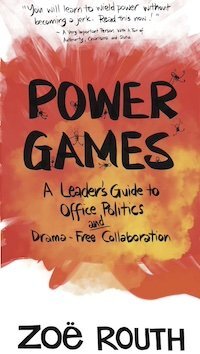
Power is key theme in the Gaia series. Want practical advice about how to use power better?
Learn more in Power Games: A leader’s Guide to Office Politics and Drama-Free Collaboration.
P.S. Want more insights on the Future of Leadership?Each month get additional insider only resources including discussion questions, water cooler factoids, implementation tip sheets/checklists/worksheets.
Join The Future of Leadership Newsletter.
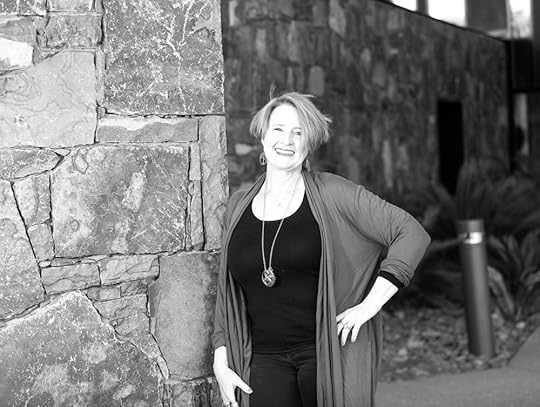
Zoë Routh is a leadership futurist, podcaster, and multiple award-winning author. She works with leaders and teams to explore what's coming and what it means for leadership of the future.
Zoë is an outdoor adventurist and enjoys telemark skiing, has run 6 marathons, is a one-time belly-dancer, has survived cancer, and loves hiking in the high country. She is married to a gorgeous Aussie and is a self-confessed dark chocolate addict.
June 4, 2025
The Olympus Project is in Giveaway this month (June)
I've listed The Olympus Project, my award-winning novel first in series, eco technothriller for GIVEAWAY in June 2025. 100 ebooks up for grabs.
Open to US readers (sorry everyone else! That's Goodreads rules, not mine.) You have until the end of the month to enter.
Go here: https://www.goodreads.com/giveaway/sh...
In the meantime, I'm 20% the way through writing book #4 in the series - the finale. Out by end of the year.
Enjoy!
Zoë
May 19, 2025
Collaboration Secrets
In these tumultuous times, the future of leadership is COLLABORATION. With such complex challenges, we need to build coalitions not factions.
But leaders often get it wrong. Here are some tips and insights to help you collaborate better.
Secret 1. Cooperation Is Not Collaboration.It may look like they are collaborating, but cooperating means only that people keep doing their own thing without getting in the way of others. True collaboration means building something together, challenging each other's ideas while deeply respecting each other's point of view. If you're the boss, keep this in mind: you are not infallible (I know, it seems implausible that you might make a mistake, but there is a still a chance, however minute).
Secret 2. Power Is Always At The Table.Until we have a common understanding and language of how power shows up and is deployed in our groups, then we will continue to suffer toxic power battles. Let's get real about power. If you're in charge, you wear a Crown, and it changes how people deal with you. Don't let it go to your head, or that Crown will struggle to rest easy on your brow.
Secret 3. When We Bring Ideas, We Bring Worldviews.We cannot solve complex problems without knowing how our worldview shapes our perception and priorities. Surface this and then we have a chance of seeing better solutions. Know your values and priorities: they shape how you perceive a problem (and might miss the solution).
Insight: Collaborative, flat groups still need structure.Here is an excerpt from my latest book, out now for orders on Kickstarter, Power Games - A Leader's Guide to Office Politics and Drama-Free Collaboration.
[In collaborative groups,] Five aspects need to be monitored, and anyone in the group may elect or be nominated to take on one of these roles.
1. Deliverables
In this role, the individual holds the whole group to account and asks gritty, tangible questions, such as:
Do we have the resources to accomplish this goal?
Who will actually do the work?
Are we meeting our deadlines?
Is the quality up to scratch?
Who is and isn’t keeping their commitments?
What’s sliding through the cracks?
2. Big picture
This role monitors the group’s overall efforts and focus. The individual can ask questions such as:
Are we living and working by our values?
Are we making progress towards our vision?
What’s on the horizon that may assist or hinder us?
What are the internal and external factors that may get in
our way?
3. Process
Not for the faint-hearted, this role tackles process and how the group is treating its obligations and each other. The individual might check and highlight things such as the following:
Healthy power structures in teams
increased emotional temperature on issues and discussions
surreptitious Power Games such as gossip, back-channelling
and undermining
groupthink and echo chambers that keep new ideas at bay
inappropriate behaviour
breaches of the Code of Conduct and Code of Ethics.
4. Communication
The role acts as a connector. The individual asks questions like,
‘Who needs to know about this?’, ‘Who needs to be consulted?’
and ‘Who will be affected by this?’ By ensuring the messages are clear and distributed effectively across the right channels, the communication role minimises gossip, innuendo and assumptions between team members, and with stakeholders and those outside the organisation.
5. Energy
This is the cultural pulse-checker of the group. The individual may be called on to lead the drive, enthusiasm and dynamic nature of the group. The person in this role keeps the group positive and focused on welcoming new members, ensuring the ease of belonging and inclusion, and leading celebrations and acknowledgment of individual and team efforts.
Collaboration is hard. With strong group structure and processes, we can do it better.
Live with grace, lead in service.
Zoë

Learn more about Collaboration in Power Games: A leader’s Guide to Office Politics and Drama-Free Collaboration.
P.S. Want more insights on the Future of Leadership?Each month get additional insider only resources including discussion questions, water cooler factoids, implementation tip sheets/checklists/worksheets.
Join The Future of Leadership Newsletter.

Zoë Routh is a leadership futurist, podcaster, and multiple award-winning author. She works with leaders and teams to explore what's coming and what it means for leadership of the future.
Zoë is an outdoor adventurist and enjoys telemark skiing, has run 6 marathons, is a one-time belly-dancer, has survived cancer, and loves hiking in the high country. She is married to a gorgeous Aussie and is a self-confessed dark chocolate addict.
May 18, 2025
Power Games: my new non-fiction leadership book is out now on Kickstarter
First, power is not a dirty word.
Abuse of power is dirty. Power itself is an energising force to get stuff done.
We can learn to cultivate it in ourselves and others without losing integrity.
We can share power. Indeed, the future of successful leadership in these changeable times is collaboration. To do so effectively we need to learn to share power. This requires strong rules of engagement to keep us playing nice.
There are healthy ways to act at work and there are the shadow ways. The Manipulators, the Tyrants, the Bullies, the Gamblers, the Fanatics.
We've all experienced the undermining effect of these shadows. It's time to end this crap. Life is too short.
I'm on a mission to talk power at work, to walk back its abuse, to enable its healthy deployment so we can get good stuff done without the toxic office politics that cripples our wellbeing.
Join me. Start by getting the guidebook: Power Games. It's launching today on Kickstarter: https://www.kickstarter.com/projects/...
February 24, 2025
The Courage to Lead: Unlocking the Cauldron Within
Leadership, and teamwork, are a gutsy game. If we are to make real progress and build amazing teams, we need courage. Courage to speak our minds, courage to try new things, courage to show up and be seen.
In my facilitation work, I often see small acts of courage.
Annette never counted herself as an outdoorsy person and she was terrified of heights. After slogging up a steep hill, at the top I let the group know we had the opportunity to abseil into the mouth of a cave.
Confined spaces and heights all wrapped up in one.
Annette began to tremble and pressed her lips together.
The technician was an enthusiastic young man who gave the impression of sweeping vistas in all his gestures and demeanour, as if nature itself tilted along his axis. He beamed like the sun.
Annette hid in the shadows, dreading her turn.
One by one Hamish the technician despatched the participants down the hole into the ground, abseiling into darkness with yelps of anxiety and excitement.
Annette stood, abseiling gloves in hand, helmet clipped, headlamp on, face white.
Hamish the abseil-whisperer coached and coaxed her to the edge, securing her on belay. Her teammates cheered and encouraged. Annette said nothing. She nodded to Hamish with each of his instructions, and moved her feet in tiny steps at his bidding, breathing heavily to counter the shaking in her hands and limbs.
Bit by bit, she disappeared into the ground, and Hamish followed her progress, peering over the edge as he belayed her to safety and into the waiting arms of her whooping teammates. She’d made it.
It was the hardest thing she had ever done.
Managing our fears is a visceral, full-bodied experience. Our rational brain can tally the risks, but our survival brain floods our system with adrenaline and cortisol to ensure we stay safe. It’s uncomfortable and exhausting.
It’s easier to do hard things in a structured program.
Far more difficult is the daily imperative that calls on us to be better and bolder.
Our inner voice shuts us down. We’re not good enough. We don’t know enough. They’ll laugh at us. We’ll be attacked and ostracised.
Better to stay quiet and keep our head down.
But leadership means being visible. Leadership means being the voice for those who cannot speak for themselves. Leadership means defending the rights of those who have been oppressed by others. Leadership means living by our values even if that costs us friendships, popularity and position.
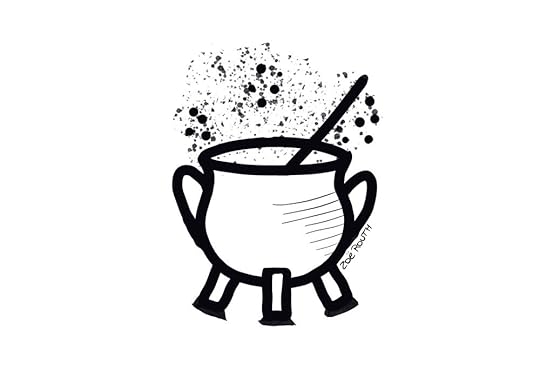
Courage is a Cauldron we need to stoke. When we fire it up, the energy of conviction and commitment boils upwards and fuels our actions.
But we forget.
We forget to keep our Cauldron boiling. We forget that it has already been filled many times before.
We have a lifetime of Courage in our Cauldron!
Stoke Your Cauldron:
Cast your mind back to your first decade. Think of challenges you experienced and overcame. List them.
Consider each next decade in turn: what have been your achievements? When did you put yourself out there and took a risk? What did you learn as a result?
What are you proud of? Write these down.
What is the bravest thing you have ever done? How did you approach it? What did you discover about yourself? Document these.
Who do you think is more brave than you? What is something you have done that they would think is courageous?
What’s one thing you are avoiding? What is on the other side of having tackled that one thing?
Dirt dive into your possible failure: imagine trying something and failing. Imagine the worst case scenario. Really feel the emotions of shame and disappointment. Once those pass, would you be okay? The answer is always yes.
For when we come to our last days, we do not want to recall what we did not do; we want to revel in the bumps and bruises of a life well-lived, of having dared greatly, of having stepped into the wilderness and found a way through.
Be the leader you aspire to be with one small courageous act at a time.
Think not of what others might think of you, but how you think and care for others.
When we spend our lives and moments in uplifting others, we find the strength to carry more than we thought.
I’m uplifted by stories of survival: of those who escaped persecution by the Nazis, and those who helped them.
I’m uplifted by stories of kindness: of those who shelter the homeless, those who listen on the end of a phone line to desperate cries of anguish, those who tend the sick and elderly with tender hands.
I’m uplifted by stories of those who speak truth to power: Alexei Navalny who railed against Putin, was jailed and likely killed for his democratic advocacy.
I want to be uplifted by your stories, your courage.
Please share them! Telling your story is an act of courage in itself. Don’t hide your courageous acts and deny the opportunity of upliftment to others.
What is something courageous you’ve done, or seen somebody else do recently? Please share.
Live with grace, lead in service.
Zoë

Learn more about the Cauldron of Courage in Power Games: A leader’s Guide to Office Politics and Drama-Free Collaboration.
P.S. Want more insights on the Future of Leadership?Each month get additional insider only resources including discussion questions, water cooler factoids, implementation tip sheets/checklists/worksheets.
Join The Future of Leadership Newsletter.

Zoë Routh is a leadership futurist, podcaster, and multiple award-winning author. She works with leaders and teams to explore what's coming and what it means for leadership of the future.
Zoë is an outdoor adventurist and enjoys telemark skiing, has run 6 marathons, is a one-time belly-dancer, has survived cancer, and loves hiking in the high country. She is married to a gorgeous Aussie and is a self-confessed dark chocolate addict.
January 1, 2025
HAPPY NEW YEAR - AND NEW BOOK OUT!
The Olympus Project is currently FREE ebook in Kindle.
Olympus Bound book 2 will be a countdown deal today from 8am PST 11am EST USA.
And book 3 Olympus Rising is out now on as a special launch price for just 99c!
Enjoy the fun ride of a future on the Moon!
Zoë
November 26, 2024
What I Learned About Teamwork From the Indonesian UN Peacekeepers
When my colleague Sheryll Fisher of Outback Initiatives rang me and asked, “Do you want to facilitate a leadership program for the Indonesian UN Peacekeepers?”, it was an immediate, “hell yes!” The chance to see how elite special forces individuals work collaboratively? I’m in.
I always learn on these programs even though I have been facilitating outdoor leadership programs for 37 years. People are an endless supply of joy, delight, and surprise.
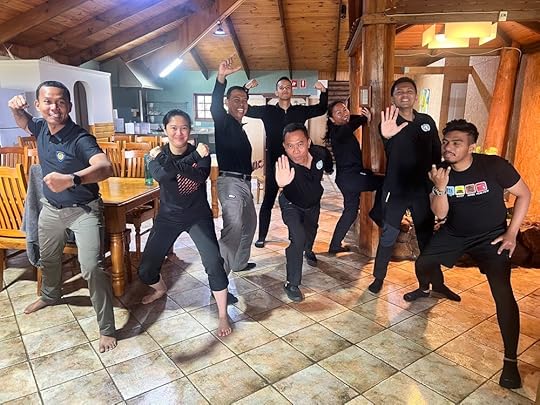
Here the team is demonstrating their own individual superpowers, channelling their favourite superhero
One of the core tenets of the Indonesian Police Force is teamwork. I had the great privilege of seeing what that looks like when I facilitated a leadership development program with Outback Initiatives for this special group of trainers for the Indonesian United Nations Peacekeepers. They came over to Western Australia for an intensive leadership development program. For a very hierarchical organisation, the insights were surprising.
Out of uniform, they looked like any other group of mid-career professionals: bright-eyed and ready to learn. Even though dazed from long travel and apprehensive about the wild adventure they were embarking on, the Indonesian UN Peacekeepers were still fresh-faced and keen. With English being a second, third or fourth language, they had to listen and check carefully to instructions, adding to the uncertainty and complexity of the tasks we had set them.
Leadership programs with Outback Initiatives are challenging by design: we want to stretch people, prod them from their cozy familiar patterns and propel them to dig deeper, work harder, and problem solve better in difficult circumstances. It’s a pressure cooker so participants can learn quickly what works, and what doesn’t, when it comes to teamwork and leadership.
These folks are no strangers to tension: many of them had been deployed to volatile parts of the planet in their mission to maintain peace. They’d been shot at, endured attacks, and dealt with shady, violent people. Asking them to solve puzzles in a park with the night approaching was not going to test their fear threshold.
Here’s what did and what it taught me about teamwork:
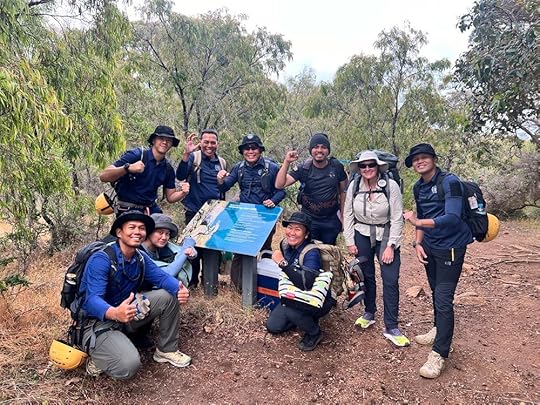
Embracing another day of high adventure
Shared mental models create a fast-track for trust.
My friend Rob Brittle wrote about this in his experience of being a flight paramedic in the daring rescue of a 65 year old man trapped in the Franklin River for twenty hours. Read about it here. What Rob shared, and what I am reiterating here, is that when we have common frameworks to problem solve, or to map a challenge, it makes it easier to come up with solutions and test ideas.
When the UN Peacekeepers tackled a problem-solving challenge they deferred to their common mental model of putting the best person for the job in charge, regardless of rank. They leveraged know-how and strengths. They trusted this framework and each other as a result.
In my own field as an experiential facilitator, my colleagues and I rely on Kolb’s learning cycle: Plan, Do, Review, Apply (and variations of that). Learning by doing with reflection is another way to summarise it. We all know that debriefing is central to the learning cycle and we incorporate it into everything we do with participants and our own teamwork. Having that common mental model builds trust in our program, the process, and each other.
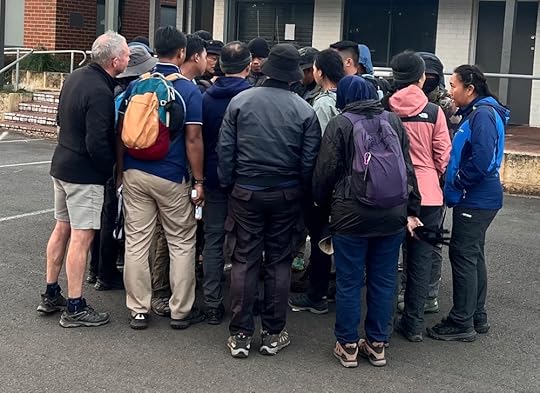
Somehow they managed to come up with a comprehensive plan of attack for one of the activities: shared mental models, huddle style!
2. Hierarchies matter until they don’t.
There was plenty of reference to ‘rank’. My team decided that they would rotate the role of leader starting with the most senior first. This way the more senior person could model the way. There’s something comforting in having someone more experienced, or more senior, go first. There is also something comforting knowing there is a pathway, a trajectory, to one’s career. The requirements are clear: you can’t jump from junior officer to Brigadier General. You need to earn credibility. There is value in experience.
There is also value in humility. One of the more senior leaders said that he learned a lot from two of his colleagues who were more junior to him in rank, but had a depth of experience in specialised skills (sniper skills and SWAT training). This matrix of respect was refreshing: authority, rank and expertise were all measures of credibility and not mutually exclusive. Entitlement was not a thing for them.
Through all the debriefs I also discovered there was a common desire to keep learning, to improve, regardless of rank. They were all equal as learners. Their enthusiastic response to every learning activity was infectious: no matter how tired they were, they were grateful for the experience and keen to make the most of it.
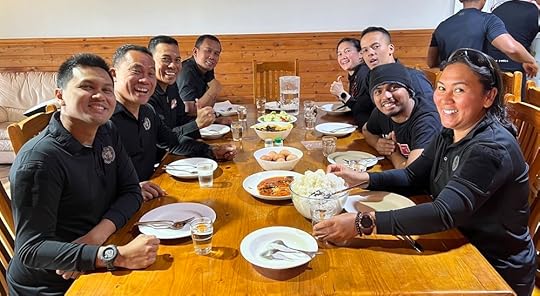
Rituals of gratitude, appreciation, and eating together for a strong team.
3. Teamwork matters.
They truly cared for one another. They listened to each other and gave open feedback to help the others learn. They didn’t blame anyone if they failed the task. They celebrated success together. They admitted limitations and worked with each other’s strengths. They appreciated each other and had fun supporting each other. It was a privilege to be part of the kindness they showed to one another.
If I could bottle what they committed to and shared with each other, then toxic cultures and dysfunctional teams would be a thing of the past.
Though I loathe what makes Peacekeeping necessary (wars, conflict, aggression), I am grateful for what these remarkable people can teach us. Purpose-led, values-driven, these brave young people risk life and limb for the safety and security of their fellow humans. Courage and compassion guide their commitment.
I encourage you to find your own inner well of passion and purpose. Show up as they do: full-hearted, team-focused, all-in. The world - and you - will be better for it.
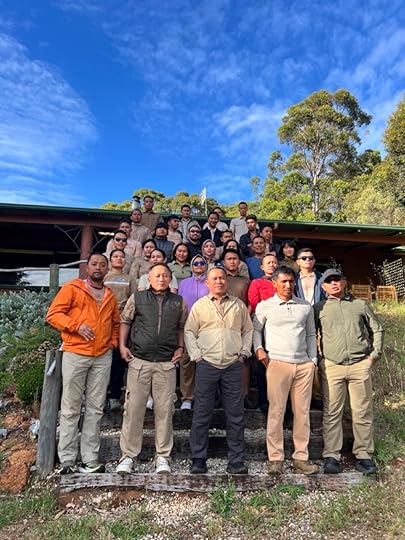
Dedicating lives to peace and humanity.
Live with grace, lead in service.
Zoë
P.S. Want more insights on the Future of Leadership?Each month get additional insider only resources including discussion questions, water cooler factoids, implementation tip sheets/checklists/worksheets.
Join The Future of Leadership Newsletter.

Zoë Routh is a leadership futurist, podcaster, and multiple award-winning author. She works with leaders and teams to explore what's coming and what it means for leadership of the future.
Zoë is an outdoor adventurist and enjoys telemark skiing, has run 6 marathons, is a one-time belly-dancer, has survived cancer, and loves hiking in the high country. She is married to a gorgeous Aussie and is a self-confessed dark chocolate addict.
November 12, 2024
The Right to Read
Reading is an essential life skill that affects all aspects of one’s life and career. Reading - and writing - have been at the core of human progress. It’s what has allowed us asynchronous sharing of knowledge and thereby accelerating innovation and social progress.
Reading helps us to share ideas, learn concepts, and inspire action. Stories in particular help us develop empathy: we can live a thousand lives through the books we read. When we walk (or read) a mile in someone else’s shoes, our worldview expands. We come to know more of human nature, of human experience.
So what’s with all the book banning?
During the 2023–2024 school year, PEN America reported over 10,000 instances of book bans in public schools, a dramatic rise from 3,362 in the previous year. What’s being banned? Books targeted include texts featuring romance, books about women’s sexual experiences, and books about rape or sexual abuse as well as continued attacks on books with LGBTQ+ characters or themes, or books about race or racism and featuring characters of colour.
Book bans often target school libraries, reducing the resources available to students. Libraries are a primary source of books for children and teens, especially for lower-income families. Limiting access to libraries reduces opportunities for reading, directly impacting literacy rates.
Restricting access to books through bans can have a cumulative negative effect on literacy rates by reducing engagement, limiting exposure, and narrowing students’ educational experiences.
This is censorship and culture wars.
These stories are seen as threats to children’s morality, risking the corruption of their impressionable young minds.
Hogwash.
The most influential aspect of a child’s upbringing occurs in the family home: how parents treat their kids and foster a curious, discerning mind.
If we teach our kids to think critically, then exposure to more ideas, not fewer, is an essential component of giving them a competitive advantage.
Books such as Jodi Picoult's "Nineteen Minutes," John Green's "Looking for Alaska," and Toni Morrison's "The Bluest Eye" have been frequently banned due to their content addressing sensitive social issues.
Of the book ban Jodi Picoult has said, “I think that some people are unhappy because it makes you look at the world in a different way. That’s what’s behind a lot of the bans.”
Yes! If our writing can help people see the world in a different way then we have helped expand thinking and empathy.
We have a right to read. We have a right to be curious and to try and understand where people are coming from. We don’t have to agree or like anything of what we read.
But to not have access to other people’s thoughts, values, visions? This makes for a smaller, meaner world, not a safer one.
What do you think? Are there some books that should be banned? Why or why not?
Share your thoughts on our Bookish Facebook page here.
Happy reading!
P.S. Want more book recommendations and writing/reading insights?Join BOOKISH, our free e-journal on all things books.

Zoë Routh is a leadership futurist, podcaster, and multiple award-winning author. She works with leaders and teams to explore what's coming and what it means for leadership of the future.
Zoë is an outdoor adventurist and enjoys telemark skiing, has run 6 marathons, is a one-time belly-dancer, has survived cancer, and loves hiking in the high country. She is married to a gorgeous Aussie and is a self-confessed dark chocolate addict.
October 14, 2024
How Small Experiments Can Build Big Change in Workplace Culture
Likely you have a solid strategic plan that you are in the middle of delivering. But what happens when conditions change?
Just like sailors who need to trim sails when the winds shift, leaders need to adjust their approach when trends emerge and circumstances deviate.
Like when your culture starts to degrade and you realise things are not where they ought to be.
We will apply Amy Edmondson’s framework from her book, Right Kind of Wrong: The Science of Failing Well, to a workplace culture experiment that will hopefully improve the psychological safety and innovation of your team culture.
Start with a Hypothesis:"If we create a safe and structured environment for open feedback and idea sharing, team members will contribute more diverse and innovative ideas, leading to higher engagement and improved problem-solving."
Step 1: Define the ObjectiveThe goal of the experiment is to increase the level of open communication, feedback, and collaboration among team members. The underlying assumption is that by fostering a psychologically safe environment, the team will feel more comfortable sharing bold ideas and discussing mistakes, which will ultimately improve the team’s creativity and problem-solving capabilities.
Step 2: Select a Small Group to StartChoose a specific team or department to pilot the experiment. Let’s say it’s a team of ten employees working in product development. By keeping it small, the experiment is manageable, and lessons learned can be applied to the rest of the organisation later.
Step 3: Establish a Structured Framework for Open DialogueThis is what you will actually do as the experiment.
For one month, implement the following practices:
Weekly 'Ideas and Failures' Meetings: Dedicate 30 minutes each week for team members to share:
One new idea they’ve been thinking about, even if it seems outlandish.
A mistake they made or a challenge they faced and what they learned from it.
Leaders Model How To Do It: Have team leaders participate by sharing their own mistakes and the lessons learned during meetings to set the tone for vulnerability and openness.
Anonymous Feedback Box: Set up a digital or physical anonymous feedback system where employees can submit thoughts, ideas, or concerns they might hesitate to share openly.
Step 4: Define Success MetricsDecide how success will be measured. Possible metrics include:
Employee participation rate: How many people actively contribute ideas or share feedback in the weekly meetings?
Survey on psychological safety: Use a pre- and post-experiment survey to measure how safe employees feel to share their ideas and mistakes.
Number of actionable ideas: Track how many new ideas are generated from the meetings that the team feels are worth pursuing.
Qualitative feedback: After the experiment, gather feedback on whether employees feel the meetings were useful and if they noticed a change in team dynamics.
Step 5: Analyse Results and LearnAfter the one-month period, review the outcomes:
Did more employees start participating in the meetings?
Was there an increase in creative solutions or ideas?
Did employees report feeling more comfortable sharing mistakes?
What was the impact on team engagement?
Ask your team members what they felt worked well in the experiment and what may have flopped. Ask for suggestions on how to make it even better.
Step 6: IterateBased on the results, adjust the experiment. For instance:
If the participation rate was low, explore why. Maybe the meeting format wasn’t comfortable for everyone, so you could try smaller group discussions.
If employees found the feedback box useful but didn’t use it much, think about whether additional anonymity or incentives for participation are needed.
If the experiment had positive results, consider scaling it to other teams and embedding it into the company’s culture practices more broadly.
Potential Outcomes:
Employees may feel more comfortable to share ideas and speak up, resulting in more diverse solutions and innovations.
Team dynamics could improve as trust and openness increase.
Leaders gain insights into what employees value and the challenges they face.
The organisation can use feedback to address systemic issues or improve processes.
Why This Works as a Culture Experiment:This experiment directly tests whether structured efforts to promote psychological safety and open communication can lead to increased creativity, better problem-solving, and a stronger sense of inclusion within the team. It’s small-scale, data-driven, and focuses on both quantitative and qualitative outcomes, making it a practical way to assess and improve team culture.
It’s a thirty minute commitment each week from team members that could result in a culture shift.
Take a look at your strategy. Are all the projects still fit-for-purpose? Are there any areas that are failing to gain traction? These might be ripe for a small experiment. Try it out!
Live with grace, lead in service.
Zoë
P.S. Want more insights on the Future of Leadership?Each month get additional insider only resources including discussion questions, water cooler factoids, implementation tip sheets/checklists/worksheets.
Join The Future of Leadership Newsletter.

Zoë Routh is a leadership futurist, podcaster, and multiple award-winning author. She works with leaders and teams to explore what's coming and what it means for leadership of the future.
Zoë is an outdoor adventurist and enjoys telemark skiing, has run 6 marathons, is a one-time belly-dancer, has survived cancer, and loves hiking in the high country. She is married to a gorgeous Aussie and is a self-confessed dark chocolate addict.
October 2, 2024
It's Booktober! Tame Your TBR Tiger
It’s a big month for books. I love Booktober!
I’m not sure it’s a thing; I just made it up. Previously I have done book reviews. This year, I’m tackling the dreaded TBR (to be read) pile. Specifically, how to tackle and tame the out of control wild beast that is your wild book list.
Amongst readers, there is an existential dread of the TBR (to be read) pile. So many books, so little time. Depending on how many books you read per year, you’re facing a mountain whose summit you will never reach. So, get real with your TBR.
Do the numbers. If you read twelve books per year (one per month), you are forty, and you expect to live to eighty, that’s forty good years of reading left. That’s 40 x 12 = 480 books left to read in your lifetime. Even if you increase your reading rate, you’ve got to triage the wazoo out of your reading options.
Decide your purpose for reading. Yes, reading can have a purpose! It might be to research a topic for work, or to expand your leadership skills, or to explore a historical period that fascinates you, or for mental stimulation, or for pure escapism. You might have several reading objectives. Choose them.
Cull your TBR. Now you have criteria to help eliminate - yes eliminate - those books on your TBR. Start with the ‘shoulds’: ditch the books that are in your TBR because ‘aunt Susan gave it to me’, or ‘it will make me smarter’, or, ‘it was the hot read from 1992’, or whatever feels like an obligation, Life is too short. Cull those suckers. If they’re paperbacks, give them away. Your TBR should be filled with awesome books that make you tingle with excitement.
Get real and stretch. How much time and energy can you dedicate to reading? Ten minutes per evening? Half an hour at lunch? Can you stretch it a bit by being creative? How about trying audiobooks and listening at 1.5x speed? You’ll be amazed at how much you can get through this way.
Get set for Booktober! Pick a book (or books according to your reading rate), and commit to enjoying those suckers this month.
I ran through this process for myself. I read 150 books per year, and I have 24 years left to 80 so I have 3900 books left to read.
I currently have 46 paperbacks hidden in my office cupboard and on the dressing room table, plus 27 fiction ebooks, and 20 nonfiction ebooks for a total of 93 books in my immediate vicinity ready to go. I did not even look at my wish lists on Amazon and Goodreads. Later.
For Booktober, I know I can get through 12.5 books on average per month, so this is what is on my shelf:
In Progress for my fun/distraction list:
Two Spies In Caracas - Moises Naim
Moscow Nights Return - Beth Macy
Central Park West - James Comey
Night Soldiers - Alan Furst
The Spy and the Traitor - (Audiobook)
Das Boot (audiobook)
Nonfiction - research for Power Games:
Broken to Safe - Tackling toxic workplace cultures and burnout - Fay Calderone
The Hollow Crown - Shakespeare on how leader rise, rule, and fall - Eliot Cohen
Women and Power: A Manifesto - Mary Beard.
The other 3.5 spots I’ll leave open to allow for impulse.
Share what you’re reading on my newly minted Bookish Facebook page.
Happy reading!
P.S. Want more book recommendations and writing/reading insights?Join BOOKISH, our free e-journal on all things books.

Zoë Routh is a leadership futurist, podcaster, and multiple award-winning author. She works with leaders and teams to explore what's coming and what it means for leadership of the future.
Zoë is an outdoor adventurist and enjoys telemark skiing, has run 6 marathons, is a one-time belly-dancer, has survived cancer, and loves hiking in the high country. She is married to a gorgeous Aussie and is a self-confessed dark chocolate addict.



